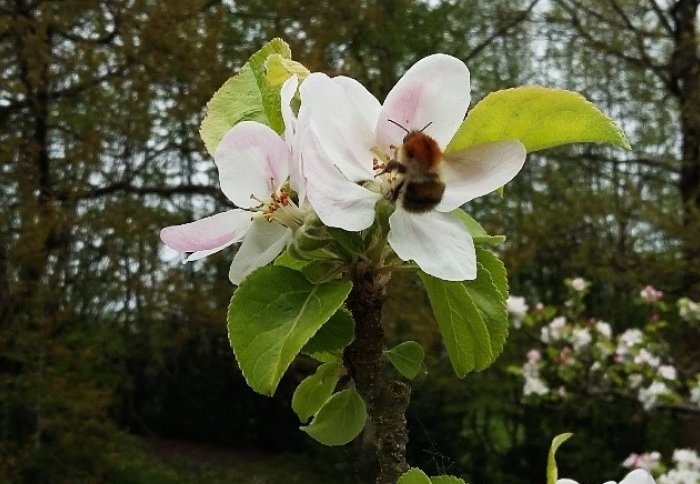Pollinators: The unsung heroes of human health

A bumblebee pollinating an apple tree
Scientists are becoming increasingly aware of the role pollinators play in ensuring human health
Pasta. Potatoes. Rice. Mmmm. These carbohydrates are some of the foods that provide the majority of calories that humans consume. They are also sourced from plants that are largely self-pollinated.
But these foods tend to be low in micronutrients – substances that humans need in small quantities to remain healthy. Indeed, human dependence on these delicious crops has actually led to a large-scale micronutrient deficiency (also called the “Hidden Hunger”), affecting around two billion people worldwide.
Luckily, micronutrients are not hard to come by: they can be found in many other food crops, like fruits, vegetables and nuts. But there is a catch – many of these crops depend to some degree on animal pollinators, and recent reports provide evidence of current worldwide declines in pollinator abundance and diversity.
It has long been recognized that agriculture depends on animal pollinators: an estimated 39 crops (of the leading 57 single crops) increase their production with pollinating animals. The economic value of this has been estimated at over €150 billion each year.
More recently, however, we are also realizing that animal-pollinated crops don’t just add a nice variety to our diets, they are also essential for human health. For example, 98% of vitamin C (a chemical that prevents us from getting scurvy) that humans consume comes from animal-pollinated crops, with citrus fruits being key contributors. Further, some antioxidants (such as lycopene, β-crytoxanthin and β-tocopherol) can only be obtained from animal-pollinated plants.
Other nutrients, like vitamin A, vitamin E, calcium, folate and fluoride, are also produced primarily by animal-pollinated plants. We can also get some of these nutrients from eating meat and dairy, or added to the diet in supplements, but issues surrounding our reliance and the long-term sustainability of these practices has been raised given their contribution to the carbon footprint and usage of water.
Another twist to the tale is that even for crops that are not strictly animal pollinated, i.e. can also self-pollinate or wind-pollinate, nutritional quality can be enhanced by animal pollination. For instance, when almonds are animal pollinated, they have increased concentrations of oleic acid, an omega-9 fatty acid thought to be cardioprotective.
So, what are the implications of this?
Pollinators are essential for many crops containing essential micronutrients, and for maximizing the concentrations of micronutrients within crops. If we want to combat the “Hidden Hunger”, we must therefore prevent widespread pollinator declines in abundance and diversity.
Intensive agriculture, through pesticide use, land-use change, habitat fragmentation and monocrops, is a main driver of these declines, and climate change is only going to exacerbate these trends.
We need to spread awareness about the importance of pollinators, especially to policymakers, who have the ability to enact regulations making agriculture more sustainable. This is a matter not only of diversity, but also of human health.
-
This blog article was written by Aoife Cantwell-Jones who was inspired during her Imperial undergraduate about the importance of insect pollinators and the problems they are facing.
As part of her Imperial EEC Masters of Research degree, she has now joined the group of Dr Richard Gill looking to understand the threats to insect pollinators, where she will be using museum specimens to understand how bumblebees have responded to a century of climate change in UK.
Article text (excluding photos or graphics) © Imperial College London.
Photos and graphics subject to third party copyright used with permission or © Imperial College London.
Reporter
Aoife Cantwell-Jones
Department of Life Sciences